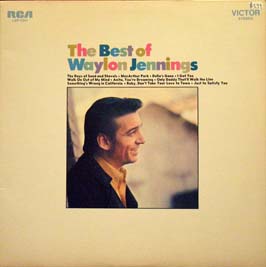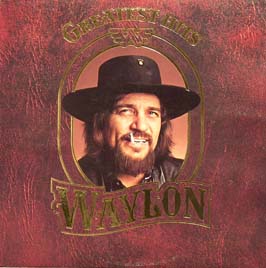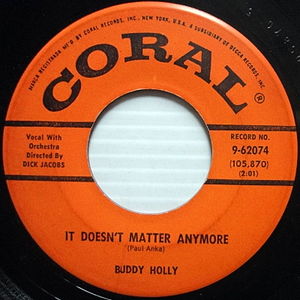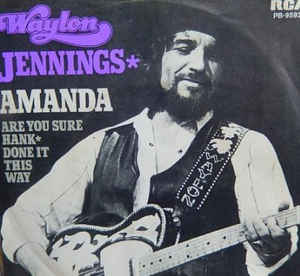Related Research Articles

"That'll Be the Day" is a song written by Buddy Holly and Jerry Allison. It was first recorded by Buddy Holly and the Three Tunes in 1956 and was re-recorded in 1957 by Holly and his new band, the Crickets. The 1957 recording achieved widespread success. Holly's producer, Norman Petty, was credited as a co-writer, although he did not contribute to the composition.
"Heartaches by the Number" is a popular country song written by Harlan Howard, and published in 1959. The sheet music was a best seller in both the US and Britain in January 1960.

Only the Greatest is a studio album by American country music artist Waylon Jennings, released in 1968 on RCA Victor. It includes the single "Only Daddy That'll Walk the Line," which Jennings took to #2 on the country music charts that year.
"Mammas Don't Let Your Babies Grow Up to Be Cowboys" is a country music song first recorded by Ed Bruce, written by him and his wife Patsy Bruce. His version of the song appears on his 1976 self-titled album for United Artists Records. In late 1975 and early 1976, Bruce's rendition of the song went to number 15 on the Hot Country Singles charts. This song was featured on Chris LeDoux's album released January 20, 1976, Songbook of the American West.

The Best of Waylon Jennings is a compilation album by American country music artist Waylon Jennings, released in 1970 on RCA Nashville.

Greatest Hits is a compilation album by American country music artist Waylon Jennings, released in 1979 by RCA Records.

"Oh Lonesome Me" is a popular song written and recorded in December 1957 by Don Gibson with Chet Atkins producing it for RCA Victor in Nashville. Released in 1958, the song topped the country chart for eight non-consecutive weeks. On what became the Billboard Hot 100, it peaked at No. 7. It was Gibson's only Top 10 hit on the pop chart. Its B-side was "I Can't Stop Loving You", which peaked at No. 7 on the C&W Jockey charts and became a standard song about unrequited love. The vocal backings on both songs were provided by the Jordanaires.
"Please Remember Me" is a song co-written by American country music artist Rodney Crowell with lyricist Will Jennings. Originally recorded by Crowell for his 1995 album Jewel of the South, his version was released as its lead single and peaked at number 69 on the Billboard country chart in early June.
The Kentucky Headhunters are an American country rock & southern rock band founded in 1968 as Itchy Brother. The band's discography comprises nine studio albums, six compilation albums, two video compilations and 27 singles. Of their albums, their 1989 debut Pickin' on Nashville is certified double platinum in the United States and Canada, while 1991's Electric Barnyard has a gold certification in both countries. Of the band's singles, four have reached Top 40 on the U.S. Billboard Hot Country Songs charts. Their highest chart peak is the number 8 "Oh Lonesome Me", which was originally a Number One single for Don Gibson.
"Wrong" is a song written by Steve Seskin and Andre Pessis, and recorded by American country music singer Waylon Jennings. It was released in May 1990 as the first single from his album The Eagle.

"It Doesn't Matter Anymore" is a pop ballad written by Paul Anka and recorded by Buddy Holly in 1958. The song was issued in January 1959, less than a month before Holly's death. "It Doesn't Matter Anymore" reached number 13 as a posthumous hit on the Billboard Hot 100 chart in early 1959, shortly after Holly was killed in a plane crash on February 3, 1959. The single was a two-sided hit, backed with "Raining in My Heart". "It Doesn't Matter Anymore" was Holly's last US Top 20 hit and featured the orchestral backing of Dick Jacobs. It was also successful in the United Kingdom, where it became the country's first posthumous number 1 hit.

Sunshine and Rain is the eleventh studio album by American country singer Connie Smith, released in October 1968 by RCA Victor. Sunshine and Rain featured an assortment of both new material and covers of songs by other country artists. The album reached the top 40 of the American country albums chart and received a favorable review from Billboard magazine following its release.

"Amanda" is a 1973 song written by Bob McDill and recorded by both Don Williams (1973) and Waylon Jennings (1974). "Amanda" was Waylon Jennings's eighth solo number one on the country chart. The single stayed at number one for three weeks on the Billboard Hot Country Singles chart.
"I'm a Ramblin' Man" is a song written by Ray Pennington. He recorded the song in 1967 for Capitol Records and took it to number 29 on the country charts.
"I Still Miss Someone" is a song co-written by Johnny Cash and his nephew Roy Cash, Jr. and originally recorded by American country music singer Johnny Cash. He first recorded it in 1958 as the B-side to "Don't Take Your Guns to Town".
"Lovin' Her Was Easier " is a song written, composed, first recorded, and first released by Kris Kristofferson. It was also recorded and released by Roger Miller, who included it on his album The Best of Roger Miller and released it as a single in July 1971. Ten years later, it was recorded by Tompall & the Glaser Brothers for the album Lovin' Her Was Easier.

"Sweet Music Man" is a song written and recorded by American musician Kenny Rogers. It appears on his 1977 album Daytime Friends, from which it was released as the final single.

The following is a detailed discography of all singles released by American country music singer Waylon Jennings. A total of 16 Jennings' singles have reached number one on music charts.
"Even Cowgirls Get the Blues" is a song written by Rodney Crowell. It has since been covered by several artists, notably La Costa, Emmylou Harris and Lynn Anderson. Crowell claims to have written "Even Cowgirls Get The Blues" about Harris and her pal Susanna Clark. The title of the song is taken from the then-popular novel of the same name by author Tom Robbins. The song has been released as a single twice and has also appeared on albums of various artists.

Seven Lonely Days is a studio album by American country singer Jean Shepard. It was released in September 1969 by Capitol Records and was her fourteenth studio album. The ten-track collection featured several covers, including the title track. Released as a single, the title track reached the top 20 of the US country songs chart. The album itself also reached the US country albums survey. Seven Lonely Days received reviews from both music magazines and music websites following its release.
References
- 1 2 Whitburn, Joel (2008). Hot Country Songs 1944 to 2008. Record Research, Inc. p. 207. ISBN 978-0-89820-177-2.
- ↑ "Nashville Cat: Wayne Moss". Country Music Hall of Fame. Retrieved 27 September 2024.
- ↑ Whitburn, Joel (2005). Hot Country Songs 1944 to 2005. Record Research, Inc. p. 23. ISBN 0-89820-165-9.
- ↑ Nashville Rebel (liner notes). Waylon Jennings. New York, New York: Sony BMG Music Entertainment/Legacy Recordings. 2006. pp. 132–139. 82876 89640 2.
{{cite AV media notes}}: CS1 maint: others in cite AV media (notes) (link) - ↑ Jurek, Thom. "Only the Greatest". Allmusic . Retrieved 8 September 2010.
- ↑ "Album reviews". Billboard. 20 July 1968. p. 73.
- ↑ Bracket, Nathan; Christian Hoard (2004). The New Rolling Stone Album Guide . Simon and Schuster. p. 428. ISBN 0743201698 . Retrieved 8 September 2010.
only daddy that'll walk the line.
- ↑ "RPM Country Tracks for September 30, 1968". RPM. Retrieved 8 September 2010.
- ↑ "Waylon Jennings Chart History (Hot Country Songs)". Billboard.
- ↑ Whitburn, p. 223
- ↑ "The Kentucky Headhunters Chart History (Hot Country Songs)". Billboard.